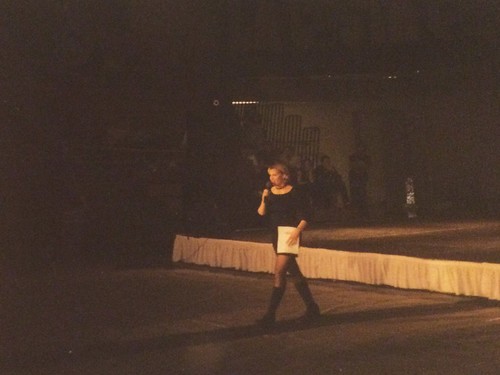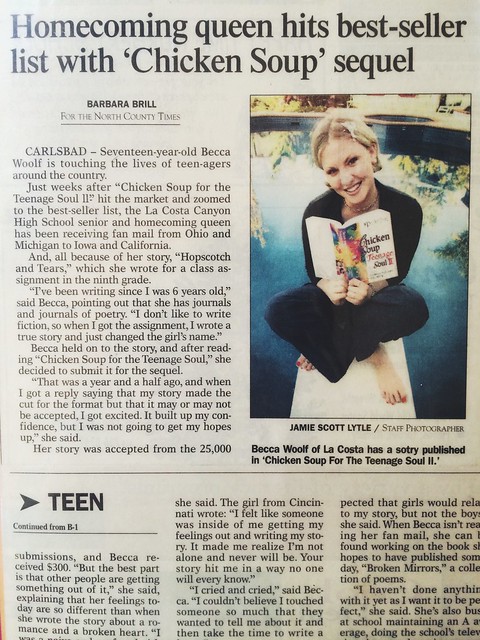Last week I read an article that riled me up in such a way I had to take a walk and shake my head and call my mom and vent for an hour about how screwed up everything is and the system and "how are adults so blind, Mom. How are adults so blind?"
I don't know about you guys but my mother raised me to believe that my voice mattered... I even started a segment on our school news program called "Students Speak Out" so that students could voice their concern to the entire student body and faculty during the morning announcements. The high school I attended was EXTREMELY supportive of its student body. And when it wasn't, well, here's a microphone...
This was the conversation my mother and I had after reading the article that I am about to quote like whoa because the entire thing is required reading for all.
Via The Atlantic:
For the past four months, a group of Kentucky teenagers has been working to make a one-sentence change to a state law. In the history of student activism, this is not a big ask. They want local school boards to have the option—just the option—of including a student on the committees that screen candidates for superintendent jobs.
"I thought everyone would view it as a no-brainer," said Nicole Fielder, 18. She said this on Tuesday from Frankfort, the state’s capital, where she was missing classes in order to advocate—for the sixth time—for this bill.
The sixth time.
For the right to INCLUSION.
An 18 year old student, who is legally an adult...
The author of the article (a clear advocate for teen voices being respected, good for her) then went on to write:
In the eight years I’ve been writing about education, my best sources have been students. An 11th grader in Washington, D.C., named Allante Rhodes told me that, while it was nice his high school offered a Microsoft Word class, only six of the campus’ 14 computers worked; he often spent his computer class reading a handout given to him by the teacher. That was good for me to know.
Meanwhile, Andrew Brennen, a 12th-grader who had moved five times as a teenager, told me that his grades depended on his zip code. In Georgia, he was at the top of his class; in Maryland, the very next year, his grades plummeted and he had to retake Spanish altogether. In Kentucky, he did fine in science but struggled with math. And that’s why he thought adopting the Common Core State Standards made sense. "Honestly," he told me, "you spend 35 hours a week in a classroom, you know what kind of things work and don’t work."
One cannot strip the power from the people they are serving and expect said people to flourish. We cannot elevate our student body without allowing them a say in their lives. We cannot tell our young people to use their voices while simultaneously unplugging the microphone. And demeaning them.
Which happens everywhere and every day in ALL states.
We do not value our youth the way we should, plain and simple. We discount their awareness, wisdom and fight.
Feeling like I had a voice that mattered as a teenager WAS EVERYTHING to me. It's one of the reasons I have involved myself with Get Lit and am so passionate about ALL teen voices. And, yes. so-called "popular girls" have them, too. (This is another common misconception. That girls who "have everything together" have everything together. They do not. Not even close. But neither do we, the adults. And that's okay. One does not contribute to society because she has all the answers, one contributes because she is willing to admit that she doesn't. None of us do.)
Which happens everywhere and every day in ALL states.
Feeling like I had a voice that mattered as a teenager WAS EVERYTHING to me. It's one of the reasons I have involved myself with Get Lit and am so passionate about ALL teen voices. And, yes. so-called "popular girls" have them, too. (This is another common misconception. That girls who "have everything together" have everything together. They do not. Not even close. But neither do we, the adults. And that's okay. One does not contribute to society because she has all the answers, one contributes because she is willing to admit that she doesn't. None of us do.)
This was framed on my wall senior year.
This is what I'm talking about. Because the voices of young people, willing to speak and stand up in front of audiences and write op-eds in their local papers deserve our support. They deserve our ears and our eyes and our applause.
To me, it is a crime that in America, as children and young adults rise every morning to pledge their allegiance to the flag, "with justice for all," they are systematically being denied a just say in an education that is rightfully theres.
In the words of teen advocate, Hiatt Allen of Kentucky in his recent op-ed for Kentucky.com:
When he was just 14, future president John Quincy Adams represented the United States on a mission in Russia to convince Catherine the Great to support the U.S. cause. Arkansas' teenaged Little Rock Nine helped spearhead the integration of the state's public schools during the height of racial tension. More recently, 17-year-old Malala Yousafzai won the Nobel Peace Prize fighting for the rights of girls worldwide to receive an equitable education.
And in his continued words (found in the comments of his article):
"We learn democracy every day in school, so why should schools prevent its students from practicing it? We are not just students, we are citizens of this state. It's time students had a real voice instead of being shut out of the system."
And good for him, right? Good for Hiatt! Because a student that recognizes the power of his voice in a system that belittles it, will someday become the adult that makes change.
I just hope that he, like so many adults, doesn't grow up and forget what it feels like to be teenaged. That he continues to value young voices and the importance of giving them a say in their own lives.
To me, it is a crime that in America, as children and young adults rise every morning to pledge their allegiance to the flag, "with justice for all," they are systematically being denied a just say in an education that is rightfully theres.
In the words of teen advocate, Hiatt Allen of Kentucky in his recent op-ed for Kentucky.com:
When he was just 14, future president John Quincy Adams represented the United States on a mission in Russia to convince Catherine the Great to support the U.S. cause. Arkansas' teenaged Little Rock Nine helped spearhead the integration of the state's public schools during the height of racial tension. More recently, 17-year-old Malala Yousafzai won the Nobel Peace Prize fighting for the rights of girls worldwide to receive an equitable education.
And in his continued words (found in the comments of his article):
"We learn democracy every day in school, so why should schools prevent its students from practicing it? We are not just students, we are citizens of this state. It's time students had a real voice instead of being shut out of the system."
And good for him, right? Good for Hiatt! Because a student that recognizes the power of his voice in a system that belittles it, will someday become the adult that makes change.
I just hope that he, like so many adults, doesn't grow up and forget what it feels like to be teenaged. That he continues to value young voices and the importance of giving them a say in their own lives.
You can read my entire column, here.
GGC




0 comments:
Post a Comment